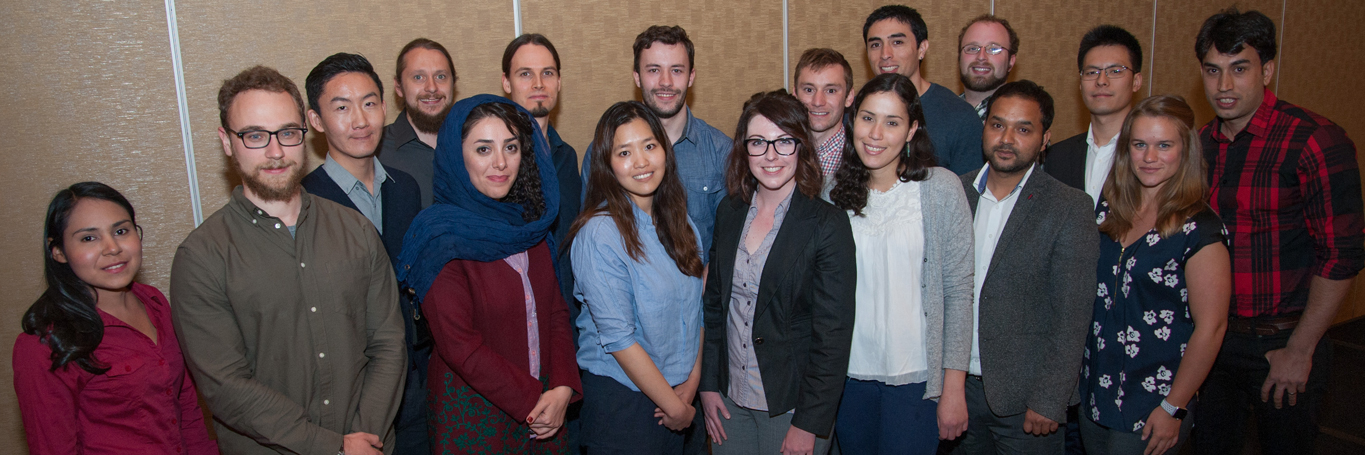Below travel grant recipients from the previous SSA Annual Meeting in Denver, Colorado share some of their thoughts about their experience attending the annual meeting as travel grant winners.
SSA hopes these testimonials will encourage other students and international members to apply for these grant opportunities. Special thanks to all of these past winners for sharing their personal perspectives on the overall experience.

Travel Grant Winners Find Community, Connections in Denver
This April in Denver at the SSA Annual Meeting, Anton Biryukov met one of his academic heroes.
“I had a chance to have a long chat with Rob Herrmann [of Saint Louis University], a true legend in seismology, who was willing to help me out with a few questions on my research,” explained Biryukov, a doctoral candidate in earth sciences at the University of Calgary. “As I am using his codes, I have had numerous emails with him, but never saw him before the event.”
Biryukov was one of 18 winners of the 2017 Student Travel Grants awarded to attend the 2017 Annual Meeting, chosen from a record number of applicants. He and many other winners said the meeting offered them an unusual chance to talk with some of the leading researchers in their field, in a setting that encourages in-depth discussions and thoughtful, personalized advice.
“We can actually shape the science of seismology regardless of age, and it’s really the enthusiasm and hard work that eventually define our impact.”
-Anton Biryukov
“Attending the SSA Annual Meeting is an incredibly useful experience, particularly for students,” said Tiegan Hobbs, a Ph.D. candidate in geophysics at Georgia Tech. “Every luncheon, reception or pint-and-poster is a different chance to converse with other students, learn about a new topic and interact with seismologists at all stages of their careers.
“Personally, I have felt very inspired by conversations with more senior scientists,” Hobbs added, “who have been kind enough to share their insights and knowledge about the fields they have helped shape.”
The grant winners agreed that the smaller size of the SSA Annual Meeting, compared to other geosciences meetings, helped them seek out new research collaborations. Eddie Brooks, a Ph.D. candidate in earth and planetary sciences at Northwestern University, said the SSA meeting contains a large number of talks relevant to his field, as well as a schedule that leaves plenty of time for networking. “No other conference makes it so easy and straightforward for me to interact with people in my particular subfield,” Brooks said. “I had a great time and left with some great ideas to continue researching.”
Having a meeting that focuses directly on seismology is useful to students like Sunyoung Park, a Harvard University Ph.D. candidate in earth and planetary sciences, who attended the meeting for the first time with her travel grant and received a Student Presentation Award. “It was especially great to meet experts in earthquake engineering and hazards, which I’ve found to be difficult to do in other earth science meetings,” she said.
One of the most popular events at the Denver meeting was the mentoring breakfast, which gave student and early-career seismologists a chance to ask top researchers in their field for career advice. “It was particularly useful for senior Ph.D. students like me, as the seasoned professionals provided valuable career guidance and industry insight,” said Yenan Cao, a Ph.D. candidate in civil and environmental engineering and earth sciences at the University of Notre Dame, who also attended the meeting for the first time this year.
The mentoring session “was incredibly informative, and allowed me to ask specific questions about how best to pursue my academic goals in the short and long term,” agreed Hobbs. “I left with a list of tasks and questions, which will help guide me in the coming years.”
“The two activities that I enjoyed the most were the workshop on PSHA [Probabilistic Seismic Hazard Analysis] and the mentoring breakfast,” said Maeva Pourpoint, a Ph.D. candidate in geosciences at Penn State. “The workshop was a really nice introduction to a different field of study, and both events gave me a good sense of the different career opportunities in seismology besides academia.”
Along with Herrmann, Biryukov also met a young postdoctoral fellow who had written many of the papers he had read for his Ph.D. candidacy exam. The experience made him realize, he said, that “we can actually shape the science of seismology regardless of age, and it’s really the enthusiasm and hard work that eventually define our impact.”
